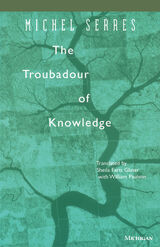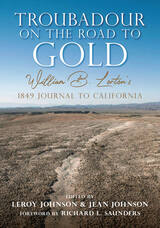2 books about Troubadour

The Troubadour of Knowledge
Michel Serres
University of Michigan Press, 1997
What do we do when we raise a child, teach a student, or educate a person as a member of society? For the French philosopher Michel Serres, all of these forms of pedagogy require painful yet exhilarating departures from home and encounters with Otherness. Like a swimmer who plunges into the river's current to reach the opposite bank, the person who wishes to learn must risk a voyage from the familiar to the strange. True education, Serres writes, takes place in the fluid middle of this crossing. To be educated is to become a harlequin, a crossbreed, a hybrid of our origins--like a newborn child, complexly produced as a mixture of maternal and paternal genes, yet an independent existence, separated from the familiar and determined.
In this wide-ranging meditation on learning and difference, Serres--the scientist turned epistemologist, philosopher turned moralist, reveler of being a half-breed from every point of view--explores numerous pathways in philosophy, science, and literature to argue that the best contemporary education requires knowledge of both science's general truths and literature's singular stories. He heralds a new pedagogy which claims that from the crossbreeding of the humanities and the sciences a new educational ideal can be born: the troubadour of knowledge.
With his agile and poetic voice, Serres has created a meditation of precisely this pluralistic creation, deftly recognizing it as a third party bred not of orderly dialectics but of the destabilizing multiplicity of the present age. Those who know the enormous range and clarity of this thinker will welcome this latest volume translated into English by Sheila Glaser with the assistance of William Paulson.
Michel Serres has taught at Clermont-Ferrand, the University of Paris VIII [Vincennes], the Sorbonne, and Stanford University, and has served as visiting professor at Johns Hopkins University. Other works of his available in English translation include Conversations on Science, Culture, and Time (with Bruno Latour), Genesis, and The Natural Contract, also published by The University of Michigan Press.
Sheila Glaser is Reviews Editor of Artforum magazine. William Paulson is Professor of French and Chair of the Department of Romance Languages and Literatures at the University of Michigan.
[more]

Troubadour on the Road to Gold
William B. Lorton's 1849 Journal to California
Edited by LeRoy Johnson and Jean Johnson, Foreword by Richard Saunders
University of Utah Press, 2020
During the California Gold Rush, many of the miners and merchants who hoped to strike it rich in California left behind letters and journals that provide valuable insights into one of the great migrations in American history. Of all the journals and diaries left behind, William B. Lorton's is perhaps the most informative and complete. Although known to historians for decades, Lorton’s journal has never been published. In this volume, LeRoy and Jean Johnson bring Lorton’s writings to life with meticulous research and commentary that broadens the context of his narrative.
Lorton’s work is revealing and entertaining. It captures glimpses of a growing Salt Lake City, the hardships of Death Valley, and the extraordinary and mundane aspects of daily life on the road to gold. With resilience and a droll sense of humor, Lorton shares accounts of life-threatening stampedes, dangerous hailstorms, mysteriously moving rocks, and slithering sidewinders. The inclusion of images, maps, and the editors’ detailed notes make this a volume that will entertain and inform.
Lorton’s work is revealing and entertaining. It captures glimpses of a growing Salt Lake City, the hardships of Death Valley, and the extraordinary and mundane aspects of daily life on the road to gold. With resilience and a droll sense of humor, Lorton shares accounts of life-threatening stampedes, dangerous hailstorms, mysteriously moving rocks, and slithering sidewinders. The inclusion of images, maps, and the editors’ detailed notes make this a volume that will entertain and inform.
[more]
READERS
Browse our collection.
PUBLISHERS
See BiblioVault's publisher services.
STUDENT SERVICES
Files for college accessibility offices.
UChicago Accessibility Resources
home | accessibility | search | about | contact us
BiblioVault ® 2001 - 2024
The University of Chicago Press









